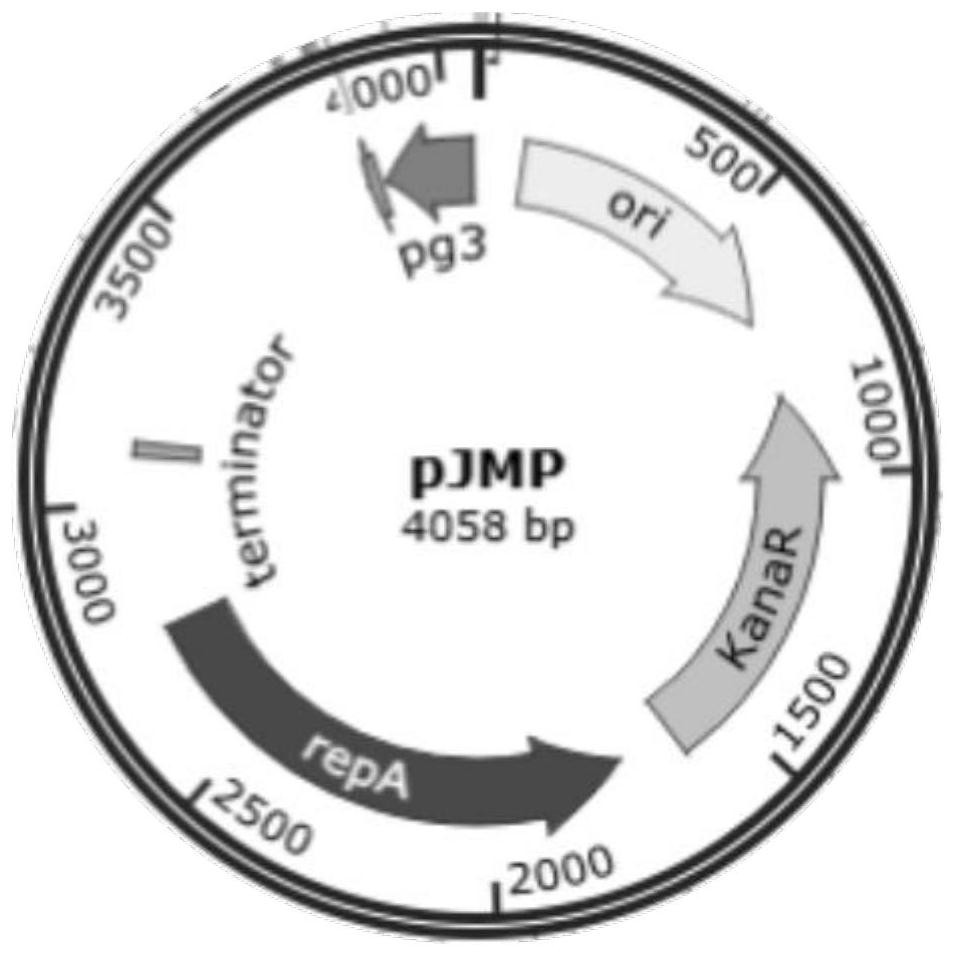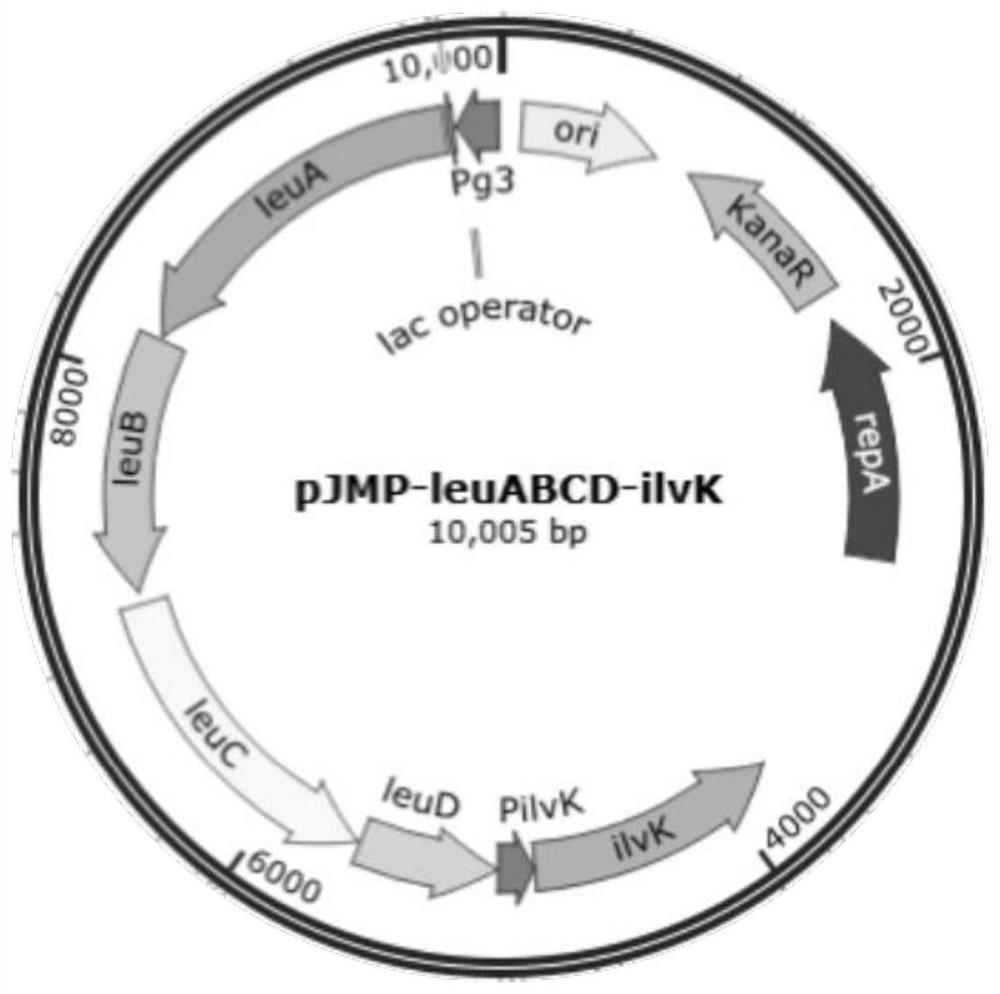A kind of recombinant bacteria with high lipopeptide production and its application
A technology of recombinant bacteria and lipopeptide, which is applied in the field of genetic engineering, can solve the problem of not increasing the yield of surfactin, and achieve good industrial application prospects and the effect of increasing yield.
- Summary
- Abstract
- Description
- Claims
- Application Information
AI Technical Summary
Problems solved by technology
Method used
Image
Examples
Embodiment 1
[0052] Example 1 Construction of plasmids carrying genes leuABCD and ilvK in the leucine synthesis pathway
[0053] Pick a single colony of Bacillus subtilis B.subtilis THY-7, inoculate it in LB liquid medium, place it in a shaker at 37°C and 200rpm for overnight culture, and collect the bacteria under the condition of centrifugation at 12000rpm and 5min. Bacterial Genome Extraction Kit to extract THY-7 genome. Using the obtained genome as a template, the upstream primer leuABCD-F (sequence shown in SEQ ID NO.8) and the downstream primer leuABCD-R (sequence shown in SEQ ID NO.9) were used for PCR amplification to obtain a leuABCD fragment. Use upstream primer ilvK-F (sequence shown in SEQ ID NO.10) and downstream primer ilvK-R (sequence shown in SEQ ID NO.11) to carry out PCR amplification to obtain ilvK fragment primers provided by Boshang Biotechnology (Shanghai) Co., Ltd., dissolved in sterile water and diluted to 10 μM for use. The polymerase, buffer and restriction endo...
Embodiment 2
[0058] Example 2 Construction of the genetically engineered bacteria B.subtilis THY-7 / Pg3-srfA (leuABCD-ilvK) overexpressing the leucine synthesis pathway
[0059] The Bacillus subtilis constructed in Example 1 carrying 2-isopropylmalate synthase LeuA, 3-isopropylmalate dehydrogenase LeuB, 3-isopropylmalate dehydratase LeuCD and branched-chain amino acid transaminase IlvK The Bacillus-Escherichia coli shuttle plasmid pJMP-leuABCD-ilvK is used to transform the competent cells of Bacillus subtilis THY-7 / Pg3-srfA by electroporation, and the genetically engineered bacteria THY-7 / Pg3-srfA (leuABCD-ilvK). Wherein, the preparation and electrotransformation of Bacillus subtilis THY-7 / Pg3-srfA competent cells adopt the method in Chinese patent document CN105400784A.
[0060] After resuscitation, take 100uL of bacterial liquid and spread it on LB solid medium containing 10-30μg / mL kanamycin, place it upside down in a 37°C incubator for overnight culture, pick a single colony, and use ...
Embodiment 3
[0061]Embodiment 3 uses genetically engineered bacteria THY-7 / Pg3-srfA (leuABCD-ilvK) to produce lipopeptide surfactant-surfactin
[0062] The genes obtained in Example 2 for overexpressing 2-isopropylmalate synthase LeuA, 3-isopropylmalate dehydrogenase LeuB, 3-isopropylmalate dehydratase LeuCD and branched-chain amino acid transaminase IlvK The engineering bacteria THY-7 / Pg3-srfA (leuABCD-ilvK) was inoculated in LB liquid medium (containing chloramphenicol and kanamycin), cultured at 37°C and 200rpm for 16h, and inserted into the container at a ratio of 5%. In a shake flask with 100 mL of fermentation medium, add IPTG when culturing at 37°C and 200 rpm for 2-6 hours, and continue culturing for 2-3 days to obtain a lipopeptide-containing fermentation broth.
[0063] The detection of surfactin in the fermentation broth adopts the method of Yu Huimin et al. (Chinese patent CN 105400784A). The statistical results of surfactin concentration in genetically engineered bacteria THY...
PUM
 Login to View More
Login to View More Abstract
Description
Claims
Application Information
 Login to View More
Login to View More - R&D
- Intellectual Property
- Life Sciences
- Materials
- Tech Scout
- Unparalleled Data Quality
- Higher Quality Content
- 60% Fewer Hallucinations
Browse by: Latest US Patents, China's latest patents, Technical Efficacy Thesaurus, Application Domain, Technology Topic, Popular Technical Reports.
© 2025 PatSnap. All rights reserved.Legal|Privacy policy|Modern Slavery Act Transparency Statement|Sitemap|About US| Contact US: help@patsnap.com



